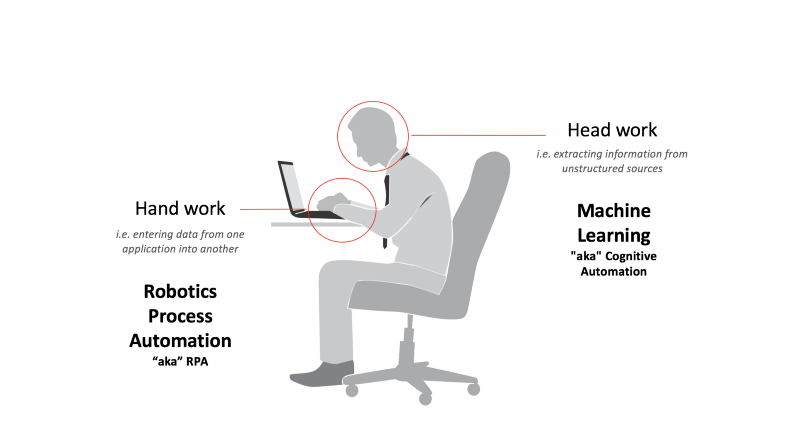“If we don’t use technology,” says Ian Weir, Head of Business Performance Improvement at Standard Bank, Johannesburg, “…cost will shoot beyond what’s bearable.” He’s right. A lot of companies have a rising volume of data that cannot be processed manually. It inevitably opens doors for automation that companies like WorkFusion specialize in. WorkFusion is a NYC-based startup that has grown from a seed round of $2.3 million in 2011, to a Round E funding of $50 million in April 2018 and has reached a valuation of $121.3M.
Standard Bank, one of Africa’s largest bank chains, is their client and has used the startup’s AI–powered RPA (Robotic Process Automation) to reduce customer onboarding time from 20 days to five minutes.
AI has been a buzzword for a while. But an acronym slowly catching on is RPA.

PC: WorkFusion
RPA is sold as follows: An average knowledge worker spends hours performing repetitive, monotonous tasks that are painful in a sleep-inducing sort of a way. Wouldn’t they prefer if these tasks were automated, too? Perhaps yes, if the economy could create new jobs for them. But an early threat or innovation (depending on if you’re a glass half full/empty kind of a person) comes in the form of RPA.
It is a type of software that mimics human activity and carries out the simple tasks for you. For example, do you want it to scrape information of a website about the specifications and price of a phone and present it to you as a spreadsheet? Done. RPA can do that for you.
Naturally, this has been a hot topic for entrepreneurs.
Like Max Yankelvich, who founded WorkFusion thinking something each person in a mind-numbing job has: It’s the 21st century, robots should have taken over repetitive tasks that are stealing precious human hours. He said in an interview, “I started thinking … there’s gotta be a way where artificial intelligence can be used generically enough to learn some of these things that these people are doing,”
In 2012, he and his co-founder, Andrew Volkov sponsored a research at MIT’s Computer Science and Artificial Intelligence Lab (CSAIL). The topic was “What if software could learn to identify high-quality work and manage the people who perform it?” Essentially, what if a robot was your boss? And in 2014, they implemented their idea by building an AI-driven software bot platform: They called it the world’s first integrated RPA and cognitive automation platform: Smart Process Automation (SPA).
By 2017, they had opened offices around the world and has acquired clients like Deloitte, Infosys, HCL, among others. But in 2017, the company also did something that led most people to hunt for a hiding caveat: It released RPA Express, an RPA tool for free. It has taken WorkFusion a separate FAQ page to convince people that there are no asterisks involved, because, understandably, people are skeptical.
Today, WorkFusion is competing with companies like UiPath which also offers a free RPA tool. But if its active community is any proof, it has been fairly successful.

PC: Workfusion
Recently, the automation startup asked the community to develop a bot that would be able to beat an app or online game at Tic Tac Toe. The two winners managed to apply different strategies to win the game, and used various approaches to implement them in the bot scripts. The next challenge is more exciting, where they’ve asked users to create a personal assistant that helps you in your everyday life.
But this is not where the money is. Workfusion has a more intelligent automation tool, called Smart Process Automation (SPA), which is pitched as any company’s automation solution. As explanation for why the company offers RPA Express for free, its website says: “Breakthrough technology generally begins as complex, expensive and scarce” and which is why RPA express is given out for free – to make “RPA widely available”.
This is, in fact, a tried-and-tested strategy for numerous companies that share a bit of their product for free to let consumers experiment. Removing the cost involved with RPA allows companies to freely discover the benefits of automation before they can decide to sign up for a full system. Still, WorkFusion’s effort is laudable in an industry where data science, much like music programming, was reserved for the elite.
But the NYC-based startup also makes it a point to talk about the basics of RPA and how it is, in fact, the SPA that can fully automate tasks without limitations. SPA uses machine learning to identify what a customer request is: It could be access, updation, or deletion and it automatically triggers the next step, transferring special cases to a human for review. In simple terms: the software, much like us, learns from experience and becomes more capable with each request. “Things,” the company’s blog post says, “that its free RPA can’t do”.
For example, as the European Union’s General Data Protection Regulation (GDPR) came into effect on May 25, WorkFusion is posing SPA as the solution to ensure companies can easily comply with the GDPR. Very soon, banks, insurers, utilities, telcos, retailers and others will scamper to get the right processes for their data. And that’s where SPA which will quickly create automated processes and efficiently handle customer data will step in.
If you’re thinking about all the jobs this will take away in the future, you’re right. It is especially a risk for the outsourcing industry which, globally, is a $27 billion industry and automation can, like 3D printing, be a threat to the world economy and trade. But there are also opportunities here: McKinsey has noted that the automation of knowledge work is a $5 to $7 trillion opportunity.
Five years ago, Yankelvich gave a spirited talk reflecting how the tide has shifted from passive entertainment to active engagement through social media. He was talking about how AI can manage large data, analysing hundreds of data points per second to predict behaviour. For example, if a brand wanted to know how their product was doing, they would have called representative customers, but now everything they need is on social media where users are discussing their products.
In his talk, Yankelvich offered hope to millions threatened by AI: But it is not possible for technology to detect spam or sarcasm.
Today, WorkFusion is talking about the indomitable potential of technology and how the software observes us and learns. Still, the picture of a robot as a boss seems alarmist (or wishful?) at best.
Subscribe to our newsletter



